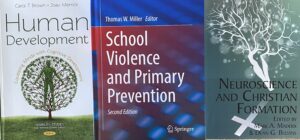“What makes this program different from others is that Carol has the research and the data to backup its effectiveness. The research on the association between working memory and academic achievement makes this program an ideal choice for sharpening a student’s academic skill. As a father, uncle, teacher, and educational researcher, I would recommend this program to any parent seeking to build the learning capacity of their child’s brain.”
John Almarode, Ph.D.
Assistant Professor
Department of Early, Elementary, and Reading Education
James Madison University
Listed below are research studies and articles related to cognitive development. Click on the Journal of Alternative Medicine Research to read the journal.
Journal of Alternative Medicine Research: Special Issue Equipping Minds Cognitive Development
Increase Cognitive Abilities Cognitive development curriculum increases verbal, non verbal, and academic abilities Dr. Carol Brown This research design was a true quantitative experimental study of the effects on working memory when applying the Equipping Minds Cognitive Development Curriculum (EMCDC) among learners diagnosed with specific learning disorder (SLD). A school who serves learners with a specific learning disorder (SLD) initiated contact with Equipping Minds, which allowed access to the population sample. Thirty-two participants in 4th through 8th grade were randomly allocated into an Active Control and a Training Group.
Case Studies Equipping Minds cognitive development training in learners with neurodevelopmental disorders: Case studies ( Autism, Post Concussion Syndrome, Fetal Alcohol Syndrome, Processing Disorders) Dr. Carol Brown
Correlation between working memory, intelligence, and cognitive functions Dr. Carol Brown
Computer training or human mediator Dr. Carol Brown
Naturalistic or biblical view of human development Dr. Carol Brown
You can read Dr.Brown’s doctoral dissertation by clicking on the link below:
Equipping Minds Applying A Biblically Based Curriculum for Improving Working Memory Dr. Carol Brown
Visual Processing Ability- Early Predictor Of Inferential Language And Phonemic Awareness Ability
Donna Williams-Piloting a Biblically Based Curriculum for Improving Working Memory as a Resource for Spiritual Formation of Older Adults
EM Cognitive Abilities Chart to Use with an IEP
Equipping Minds To Learn Four Year Case Study with a learner with Down syndrome
The principal could not believe this had happened. Until this time, Marie had made minimal progress and her academic test scores had remained static from third to fourth grade. The change in these scores had been achieved over the last nine weeks through one-on-one cognitive developmental exercises for enhancing processing, working memory, comprehension, and reasoning, which was divorced from academic content. Previously, she had received the standard interventions: remediation of content, learning strategies, and accommodations. These may have short-term benefits, but were not targeting the underlying cognitive deficits in processing and working memory, which would increase her cognitive abilities.Her MAP scores increased 20 points in reading, 11 in math, 16 in science, and 17 in language from fall to winter.
Marie would continue the cognitive developmental exercises and continue to progress academically for the next four years. In 2015, she scored in the 39th percentile in mathematics, 36th percentile in science, and the 7th percentile in reading on the Stanford 10 National Assessment Ranking as a 7th grader. Marie’s progress is significant for those who still believe 85% of the measureable intelligence is due to nature or one’s genetic factors and only 15% due to nurture or environmental factors ( Herrnstein & Murray, 1994) which holds to a limited potential for change. Marie has Down syndrome and an intellectual developmental disorder, which many believe limit her ability for significant academic gains. However, Marie’s improvement implies that cognitive developmental exercises can be generalized to apply to academic achievement for learners who have an intellectual developmental disorder. Below are the results of the MAP tests after that first nine weeks and over the next four years (Figures 1, 2, 3,4). Marie has made significant gains across the board. It should be noted that while Marie has Down syndrome, the only accommodations she received on MAP testing was extended time and having a reader for math, science, and language. She read the reading assessments herself.
Marie would graduate from high school with a regular diploma in 2021. Click Here to continue reading: Journal Article cej-article

